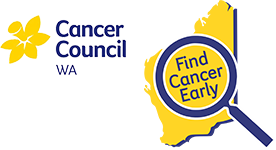Cancer message resonates
You’re not bullet proof. Go see your doctor if something is not right.
This article was written by Eliza Wynn and published in the Avon Valley and Wheatbelt Advocate on 02 October 2019.
A PUBLIC health campaign launched by Cancer Council WA is showing positive results with a recent survey revealing almost half of Wheatbelt residents took action as a result of seeing or hearing the Find Cancer Early advertisements.
Wheatbelt education officer Melissa Pickering said two years since the Find Cancer Early campaign received a $1.6 million funding boost from the government to expand the program into additional regional areas,
results show the messages are getting through, but there was still a way to go.
“The 2019 evaluation of the campaign is showing that nearly half of Wheatbelt adults took some sort of action after seeing the campaign,” Ms Pickering said.
“From there, more than half reported monitoring their symptoms and a further 39 per cent made an appointment to discuss their symptoms with a local GP.
“Significantly, nearly half of Wheatbelt adults took action within four weeks of seeing the campaign, with a further 41 per cent taking action within 12 weeks.
“While these results are pleasing, unfortunately 47 per cent of those surveyed in the Wheatbelt only knew one or two symptoms of the five most common cancers in WA which are prostate, breast, skin, bowel and lung, which
comprise almost 60 per cent of all cancer diagnoses.”
Toodyay resident Terry Keane, who was diagnosed with lung cancer, is a Find Cancer Early campaign champion, advising others to seek help early.
“You’re not bullet proof. Go see your doctor if something is not right,” Mr Keane said.
Ms Pickering said the earlier cancer is found, the greater the chance of successful treatment.
“Research indicates regional people tend to present at the GP at a later stage for a number of reasons including because they can be more optimistic, laid back and sometimes make excuses for not seeking help, which may
contribute to later stage cancer diagnoses,” she said.
“The Find Cancer Early campaign aims to improve regional cancer survival outcomes as research shows people living in regional Australia are more likely to die within five years of a cancer diagnosis than people in
metropolitan areas.
“It’s important to remember bowel cancer screening kits and mammograms are designed for people who aren’t experiencing symptoms.
“The organisation warns waiting to participate in a cancer screening program could delay your diagnosis and risk a worse outcome.”
The Cancer Council WA recommends seeing a doctor if you find blood in your poo, blood in your pee or you’ve coughed up blood, even just on one occasion.
If you would like to access Cancer Council WA services and support please call 13 11 20.
